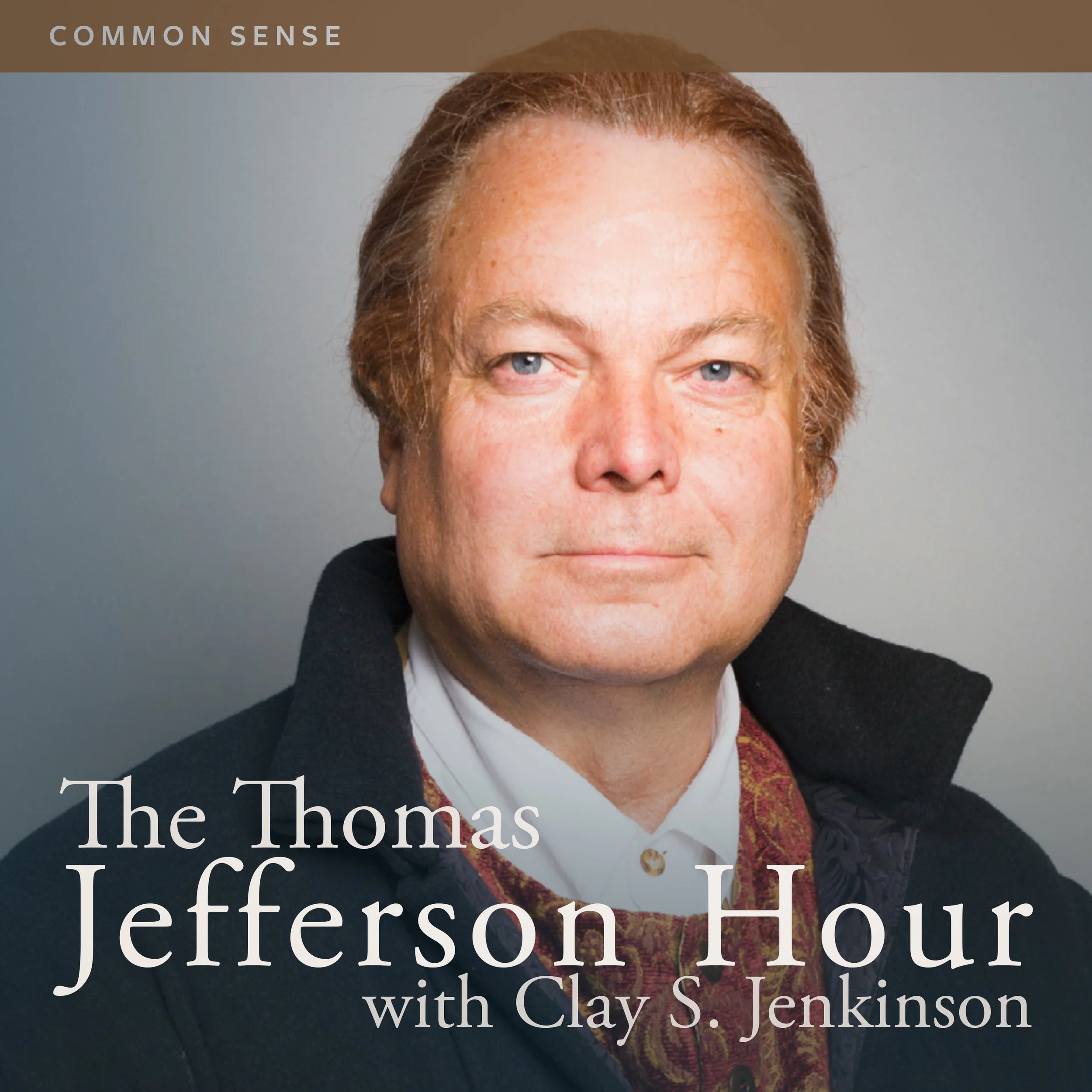We are joined this week by the author and historian Professor Joseph Ellis. He and Clay have an in-depth discussion about the Founding Fathers and their willing participation in the enslavement of people.
#1421 The Two Jeffersons
On the one hand, Jefferson wrote perhaps the most important American directive: "We hold these truths to be self-evident, that all men are created equal," but he also believed that America could never become a truly bi-racial republic, and during his lifetime he owned over 200 enslaved people. This week, Clay Jenkinson and Joseph Ellis discuss this uncomfortable twin legacy of Thomas Jefferson that we still wrestle with today.
#1405 Monuments Response
In an earlier program, the Thomas Jefferson Hour presented a discussion between Clay Jenkinson and Professor Joseph Ellis about monuments and the potential removal of some, and how we as citizens can come to better understand this issue. This week we present thoughts on this subject received from our listeners.
#1401 Match Recap with Joseph Ellis
Joseph Ellis and Clay Jenkinson revisit their debate about who the “Indispensable Man” of the American Revolution truly was. We share listener comments about the debate and answer additional questions sent in, including a request for discussion about the history of the women’s rights movement, Jefferson’s subpoena during the Burr trial and how slavery affected the economy of the southern states.
The Incomprehensible Machine
#1353 Humboldt and Jefferson
"He was iconic in the world's idea of what a nation could possibly be, and what an enlightened leader could possibly be."
— Clay S. Jenkinson portraying Thomas Jefferson
We discuss Humboldt and Jefferson: A Transatlantic Friendship of the Enlightenment by Sandra Rebok, which explores the relationship between two fascinating personalities: the Prussian explorer, scientist, and geographer Alexander von Humboldt and Thomas Jefferson. They met in the spring of 1804 for just a few days, but their correspondence went on for decades.
Jefferson's Last Letter
#1338 Notes on the State of Virginia
"But it does me no injury for my neighbour to say there are twenty gods, or no god. It neither picks my pocket nor breaks my leg."
— Thomas Jefferson, Notes on the State of Virginia
We discuss Jefferson’s only published book, Notes on the State of Virginia. Jefferson completed his first draft of the book in 1781 and first published it anonymously in Paris in 1785. It is widely considered the most important American book published before 1800.
#1335 The Mustard Seed
"You feel the wonderment of nature at its finest … it's a deep, deep, deep cultural memory of the miracle of the seed."
— Clay S. Jenkinson
We answer listener mail about John Wesley Powell, David Thompson, Daniel Flores, Jefferson’s theft of upland rice while he was in Italy, and suggestions for educating young people.
#1334 Benjamin Rush with Stephen Fried
"He and Jefferson talked about everything."
— Stephen Fried
Benjamin Rush was a physician, politician, social reformer, humanitarian, educator, and a signer of the U.S. Declaration of Independence. Rush was a leader of the American Enlightenment and an enthusiastic supporter of the American Revolution. Born the son of a Philadelphia blacksmith, Rush touched virtually every page in the story of the nation’s founding. It was Rush who was responsible for the late-in-life reconciliation between John Adams and Thomas Jefferson. This week we speak with the author Stephen Fried about his new book, Rush: Revolution, Madness, and Benjamin Rush, the Visionary Doctor Who Became a Founding Father.
#1333 The Constitution Today
"I don't think, from my point of view, you can think that the Constitution is sacred."
— Clay S. Jenkinson
We discuss Akhil Reed Amar's The Constitution Today, a selection for the Book Club, which contains essays written by Amar over the past two decades. Amar gives us a road map for thinking constitutionally about today’s America.
#1327 Complex Compromises
#1311 Jefferson's Views
"This is a French school of economics and social thinking that I subscribed to, at least in part, that says that wealth comes from the soil"
— Clay S. Jenkinson portraying Thomas Jefferson
President Jefferson answers listener questions about Jefferson as a guide for our troubled times, Jefferson’s views on slavery, and his thoughts on J. Hector St. John de Crèvecœur's Letters from an American Farmer, published in 1782.
Emancipation
#1300 Better Arguments
"Can we talk? Can we try to argue about where we are and where we're going and use the founders as a source of wisdom that might allow us to have a safe place to meet and to talk about this with civility, but with fervor?"
— Joseph J. Ellis
Clay and David discuss how to conduct better arguments, and also speak with author Joseph Ellis to talk about his new book American Dialogue, which will be released this fall.
#1299 Jefferson's Mistakes
#1292 Common Sense
"Paine refused to take proceeds from this book."
— Clay S. Jenkinson
This week, we present another of our Jefferson Hour Book Club episodes and discuss Thomas Paine’s Common Sense.
#1284 Foreign Policy
"peace, commerce, and honest friendship with all nations, entangling alliances with none"
— Thomas Jefferson, First Inaugural Address (March 4, 1801)
This week on the Jefferson Hour, we talk with President Jefferson about his struggles with foreign entanglements, and his disappointment with the American people's reactions to his decisions.
What Could We Possibly Really Know?
#1281 Unanswered Questions
"History is like a picture puzzle and half of the pieces or more are missing. There is something about Jefferson that makes us want to expose contradiction."
— Clay S. Jenkinson
Our show this week revolves around a question from listener Gino Cukale about the purported relationship between Sally Hemmings and Thomas Jefferson. We discuss the historical record and look to first-hand accounts in an attempt to answer this question.























